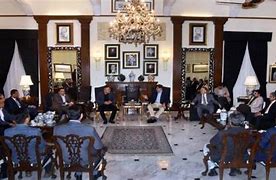The meeting was attended by provincial ministers Sharjeel Memon and Nasir Shah, along with other officials, including Syed Qasim Naveed, Secretary to the Chief Minister Rahim Shaikh, and Khurram Shahzad, Secretary of Investment.
The Chinese delegation consisted of representatives from nine medical companies, including Meng Xiaowei, Agricultural Biochar Cooperation’s Dr. M. Shahbaz, and livestock specialist Hong Pizheng. The delegation also included representatives from photovoltaic companies Wu Liangliang and Zhou Guohao, large-scale livestock importers like Mr. Weng Gang, masterbatch businesses such as Liu Wenbo, as well as solar energy companies Xu Zhigang, and others from the agriculture sector. Pakistani interpreters M. Ali Akbar, Li Wenjie, Idrees Gigi (leading the Chinese delegation), Sheikh Tehseen, and Muhammad Imran were also part of the group.
During the discussions, Chief Minister Syed Murad Ali Shah emphasized Sindh’s strategic economic position, strong infrastructure, and investment-friendly policies. The delegation, representing industries such as medical technology, biochar, livestock, photovoltaic energy, and manufacturing, expressed keen interest in forming partnerships with the Sindh government.
The Chief Minister highlighted the numerous economic opportunities in Sindh, particularly in agriculture, renewable energy, and industrial sectors. He mentioned the Special Economic Zones (SEZs) in the province, including the operational Kahirpur SEZ and the under-development Dhabeji Economic Zone.
Syed Murad Ali Shah also emphasized the investment-friendly policies and incentives offered by the provincial government. The delegation discussed potential investments in medical technology and pharmaceuticals, biochar for sustainable agriculture, livestock farming and exports, and renewable energy projects focused on solar and wind power.
The meeting concluded with the decision to establish joint working groups for targeted projects. Chief Minister Shah assured the delegation of full support from the provincial government, underlining the importance of enhancing bilateral trade and investment. The discussions ended with optimism about future collaborations, promising economic prosperity for both Sindh and Chinese businesses.









